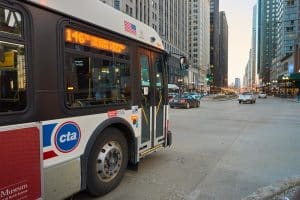South Side CTA Bus Crash May Have Been Caused by a Medical Episode
 Yesterday was like a scene out of the 90s movie Speed: an out-of-control CTA bus in the South Side caused a multi-vehicle accident that sent at least five people to hospitals throughout the city. According to ABC 7, it took several hours for the streets to be cleaned up and for the reroutes for local buses to end.
Yesterday was like a scene out of the 90s movie Speed: an out-of-control CTA bus in the South Side caused a multi-vehicle accident that sent at least five people to hospitals throughout the city. According to ABC 7, it took several hours for the streets to be cleaned up and for the reroutes for local buses to end.
Eleven vehicles in total were hit by the bus, and ABC 7 reported that “The CTA did not immediately provide any additional information about what caused the crash or the driver’s condition.”
If there’s any silver lining here, it’s that everyone appears to have survived. We’re holding onto that thread of hope, as multiple victims are still in the hospital, and we’re praying for their safe and speedy recovery. We hope the same is true for the bus driver, who was also hospitalized; we hope he makes a full recovery, and that the doctors are able to tell him what happened if a medical episode actually caused the crash.
How often do medical emergencies cause car accidents?
It’s hard to say. The last time any truly comprehensive data was evaluated was 2009. At the time, the National Highway Traffic Safety Administration (NHTSA) said there were just under 50,000 drivers who reported being a crash caused by a medical emergency between Jul 2005 and December 2007.
But here are some things we DO know:
- Fatigue is a common result of taking medications (OTC and prescription), and drowsy driving kills about 6,400 people a year.
- The chance of having a medical condition (and thus being on a prescription medication) increases as you age, and in 2022, more than 9.500 elderly drivers were killed in car accidents.
- Certain medical conditions can increase the risk of causing a crash, per a 2023 report by the NHTSA. Those conditions include:
- AD/HD
- Cardiovascular disease
- Traumatic brain injury
Other conditions, like stroke, diabetes, and even blood pressure conditions did not see an increased risk of crashes, though the data was mixed.
The point is, a true medical emergency can indeed cause a crash – but without updated information, it’s hard to say how common it actually is.
Understanding liability in an emergency-induced collision
When we talk about medical emergencies, we tend to focus on things like seizures (the most common cause of crashes in that older NHTSA data), heart attacks/strokes, and blacking out. The data shows that most folks with chronic conditions will take steps to mitigate the risks, but that is not always possible.
Here are a just a few examples of how even the best laid plans can go awry:
- A driver goes into anaphylactic shock after a bee enters through a window on a nice day and stings them, despite the driver having no history of bee sting allergies.
- A driver experiences nausea, migraine, and/or tunnel vision, causing them to veer between lanes or slam the brakes, as an effect of an unexpected panic attack.
- A driver experiences an embolism because of an unknown blood clot, causing them to pass out and hit the brakes (or the accelerator) unknowingly.
Notice the one factor all these examples have in common is not knowing. Generally speaking, medical emergencies are a viable defense if they were unforeseen. The person who knows they’re taking a medication that makes them sleepy and still gets behind the wheel is less likely to use the defense successfully than the person who suffers a heart attack while driving.
Why this bus collision case may be different from a typical car accident claim
If you were injured by another driver who had a medical emergency, you’d still file the claim against that driver’s insurance: they still hit you, after all. If that weren’t possible – because they didn’t have enough insurance, or because YOU were the one who caused the crash – then you’d file through your own policy.
But in yesterday’s crash, the other person was a CTA bus driver, and suing the Chicago Transit Authority is an entirely different beast. As a firm that’s successfully sued the CTA, we know the challenges.
First off, you need to file fast. You only get one year to file your claim instead of two, and you’re literally filing against the Authority, not some insurance company. If you thought insurers fought tooth-and-nail to keep their money, imagine how the City will fight. (Note: the CTA is specifically excluded from the Local Governmental and Governmental Employees Tort Immunity Act in Illinois, which means there are no caps for damages.)
Second, there could be multiple parties named in the lawsuit. If yesterday, the bus hit Car A and Car A hit you in Car B, then the City is going to argue that at least some liability for your losses falls to Car B. And Car A’s insurance is going to argue that it owes nothing. So, this is going to take some time to untangle for all folks involved.
One thing to remember about bus accidents, though, is that the CTA can be held legally responsible for its drivers. A sudden medical emergency is not a viable reason for the CTA to deny claims, we don’t think. And if something was wrong with the bus itself, then the claim may be even stronger. We’ll need to wait for the final investigation to be sure.
At Gainsberg Injury and Accident Lawyers, our Chicago bus accident attorneys are here to help. Please call us or fill out our contact form to schedule a free consultation.

Attorney Neal Gainsberg has spent the last 20+ years fighting to protect the rights of the injured in Chicago and throughout Illinois. For dedicated legal help with a personal injury, car accident, or wrongful death matter, contact Gainsberg Injury and Accident Lawyers in Chicago for a free consultation.
